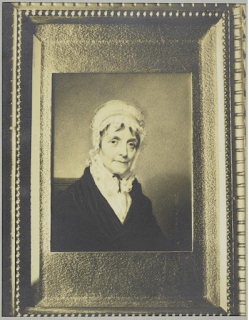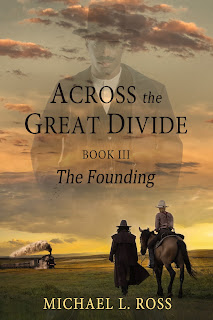I am happy to welcome author Michael Ross to the blog today. In addition to being one of my co-authors for Alternate Endings, Michael has a new book that will transport you to the 19th century. The Founding explores the fate of families forging their futures in the wake of the Civil War. For some, that meant women entering the business world in ways they hadn't before.
Welcome, Michael!
~ Samantha
~~~~~~~~~~~~~~~~~~~~~~~~~
19th Century Women in Business
Guest Post by Michael Ross
Wars often have a way of changing society, more than just fighting. For the last two centuries in the United States, the actual fighting has been done primarily by men. However, when the men are away, someone still has to tend the farms, factories, and offices. In her husband’s absence, a wife may have to take on tasks that her husband usually does, whether plowing fields, paying bills, or making strategic business decisions.
As women began to assume these new roles, society’s perception of women and their capabilities began to change, along with their legal status. In 1859, women in Kansas were granted full economic rights, to own property and control it, in the Kansas constitution. In 1861, similar rights were granted to women in Ohio, if they were not living with their husbands, including husbands away fighting in the Civil War.
In my series Across the Great Divide, one of the primary characters is Julia Crump, sister to the main character William D. Crump. In the first book of the series, The Clouds of War, Julia is a dowdy farm girl who dreams of marrying rich. She may not be beautiful like her sister Albinia, but she is smart and endowed with a great deal of common sense, the will to work, and courage. Julia manages to marry a rich man, Hiram Johannsen, whose family owns a steamship business. When Hiram’s father dies, and Hiram goes off to war, Julia is left as the manager of the steamship business. She has to learn fast, and fight for respect, but takes to business as though she were born to it.
At the end of the war, Julia has successfully navigated the business waters, and avoided sinking by either the North or the South – but Hiram is home, and she no longer has a legal right to command. Hiram is impressed with what she has accomplished. He tries to take the traditional male role, but finds that Julia isn’t satisfied, and has a better grasp of some business dealings than he does. In The Founding, after a bumpy start, they agree to work together and divide responsibilities. Since their primary base is Cincinnati, Ohio, the laws on women’s rights from 1861 that gave Julia authority during the war seem more natural than they once did, and they combine forces to prevent the ruin of their business as steamships fall and railroads rise.
The latter half of the 19th century and the early part of the 20th was a time of rapid change for women. While most women still didn’t work outside the home, some did – particularly widows and women not ready to rush into marriage. The Civil War killed as many as 1 in 10 adult white males in the country, from ages 17 to 70 (Exact figures vary). That left a lot of women without husbands, and children to feed. Most found a way to re-marry, in time. Many inherited their husband’s property, and some were in no hurry to give it up. Following 1900, most women in the United States did not work outside the home, and those who did were primarily young and unmarried. In that era, just 20 percent of all women were “gainful workers,” as the Census Bureau then categorized labor force participation outside the home, and only 5 percent of those married were categorized as such. (1)
Julia is barren and never has children, which is unusual for the era. She pours herself into working with her husband and making the business a success, as we see in this short excerpt.
~~~~~~~~~~~~~~~~~~~~~~~~~
Abilene, Kansas, 1868
When Julia returned home, the front porch lamp was lit, and she could see Hiram on the porch swing, probably furious after arriving home to a dark house with no supper and no word. Served him right, she thought. The very idea of permitting the sale of a major stake in the railroad without her still set her boiling.
“Good evening, Hiram. I hope your day went well.”
He stood, clutching one arm of the porch swing as though to snap it in half.
“Why weren’t you here? And not even a word. I might have looked over half the town for you.”
“You might have, but you didn’t, did you? I had no idea when to expect you home. You didn’t tell me. I’ve been visiting Mrs. Pomeroy, who seems better informed on many issues than I am. You did tell me to cultivate the wives, did you not? Of course, we needn’t worry about Mrs. Gould anymore, and it appears not much for Mrs. Pomeroy either. When were you planning to tell me?”
“Now, Julia, you must understand . . .”
“What is it I must understand? You think me incapable of understanding anything.”
“No, it’s just . . . bills have been mounting and not much income. I didn’t want you to worry your pretty little head.”
When she heard that, she exploded. “My pretty little head! Is that what you think of me? I know as much as you do about this company, and you know it!” She drew her eyebrows together and glared at him, eyes shooting flames. She wanted to slap him. Her hurt and anger threatened to overwhelm her. She would not cry! She threw her umbrella at him, point first, hitting a shin.
“Ow! What was that for?”
“My pretty little head ran the company for three years. I think I can be trusted to know about a potential sale that affects everything. But if you think not, then my heavens! How can I even be trusted with shopping and getting your meals? I might just forget altogether!”
“I don’t like your tone. See here—”
“No, you see here! I am in this godforsaken cow town with drunks, gunfights, heat, and bugs instead of our comfortable home in Cincinnati to be with you and to help with the railroad, which was my pretty little head’s idea! Instead of a partnership, you think you’re a one-man show. I have to find out from Mr. Peter that we’re hiring five hundred for the southern line. Visiting Martha Pomeroy, I couldn’t ask for more details without appearing a fool. She did tell me that her husband swindled the Pottawatomie out of the best farmland in Kansas under threat of army intervention.”
Hiram’s shoulders drooped, and his head lowered in surrender. “I’m sorry. I only meant to save you from worry.”
“Don’t patronize me. We’re in this together, remember? For richer or poorer, or whatever it was in that Swedish marriage ceremony. I know how to read a balance sheet. If we’re in trouble, we share it. If we triumph, we share that.”
CONTINUE READING THE FOUNDING
Two men, two dreams, two new towns on the plains, and a railroad that will determine whether the towns — one black, one white — live or die.
Will Crump has survived the Civil War, Red Cloud’s War, and the loss of his love, but the search for peace and belonging still eludes him. From Colorado, famed Texas Ranger Charlie Goodnight lures Will to Texas, where he finds new love, but can a Civil War sharpshooter and a Quaker find a compromise to let their love survive? When Will has a chance to join in the founding of a new town, he risks everything — his savings, his family, and his life — but it will all be for nothing if the new railroad passes them by.
Luther has escaped slavery in Kentucky through Albinia, Will’s sister, only to find prejudice rearing its ugly head in Indiana. When the Black Codes are passed, he’s forced to leave and begin a new odyssey. Where can he and his family go to be truly free? Can they start a town owned by blacks, run by blacks, with no one to answer to? But their success will be dependent on the almighty railroad and overcoming bigotry to prove their town deserves the chance to thrive.
Will’s eldest sister, Julia, and her husband, Hiram, are watching the demise of their steamboat business and jump into railroads, but there’s a long black shadow in the form of Jay Gould, the robber baron who ruthlessly swallows any business he considers competition. Can Julia fight the rules against women in business, dodge Gould, and hold her marriage together?
The Founding tells the little-known story of the Exodusters and Nicodemus, the black town on the plains of Kansas, and the parallel story of Will’s founding of Lubbock, Texas, against the background of railroad expansion in America. A family reunited, new love discovered, the quest for freedom, the rise of two towns. In the end, can they reach Across the Great Divide? The Founding is the exciting conclusion to the series.
GET YOUR COPY OF THE FOUNDING ON AMAZON
Connect with the author:
Michael Ross is a lover of history and great stories.
He’s a retired software engineer turned author, with three children, and five grandchildren, living in Newton, Kansas with his wife of 39 years. Michael graduated from Rice University and Portland State University with degrees in German and software engineering. He was part of an MBA program at Boston University.
Michael was born in Lubbock, Texas, and still loves Texas. He’s written short stories and technical articles in the past, as well as articles for the Texas Historical Society.
Across the Great Divide now has three novels in the series, The Clouds of War, and The Search, and the conclusion, The Founding. The Clouds of War was an honorable mention for Coffee Pot Book of the Year in 2019, and an Amazon #1 best seller in three categories, along with making the Amazon top 100 paid, reviewed in Publisher's Weekly.
The Search won Coffee Pot Cover of the Year in 2020, and Coffee Pot Silver Medal for Book of the Year in 2020, as well as short listed for the Chanticleer International Book Laramie Award.
Connect with Michael online: Website, Twitter, Facebook, LinkedIn, Instagram, Book Bub, Amazon Author Page, Goodreads
(Photos are property of Michael Ross. Copyright (c) HistoricalNovelsRUs 2018-2022)







